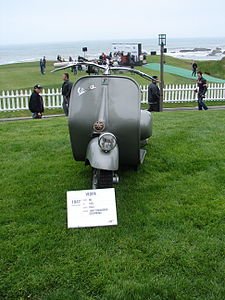Vespa 98

|
|
| Vespa 98 | |
| Manufacturer | Piaggio |
| Production period | 1946 to 1947 |
| class | Scooter |
| Motor data | |
| Single cylinder - two-stroke engine | |
| Displacement (cm³) | 98 |
| Power (kW / PS ) | 3.2 hp at 4500 rpm |
| Top speed ( km / h) | 60 |
| transmission | 3-speed (manual transmission) |
| Brakes | Drum brakes |
| Wheelbase (mm) | 1170 |
| Dimensions (L × W × H, mm): | 1655 × 700 × 860 |
| Empty weight (kg) | 60 |
| Previous model | Vespa MP6 (prototype) |
| successor | Vespa 125 |
The Vespa 98 (also V.98 ) was the first series-produced motor scooter from the Italian manufacturer Piaggio .
The Vespa 98 was built between 1946 and 1947 and divided into four series: V.98 / 1 and V.98 / 2 and from 1947 V.98 / 3 and V.98 / 4, the modifications being insignificant. The basis for the first model were the prototypes Paperino (or MP5) and MP6 by Corradino D'Ascanio and Enrico Piaggio , an essential feature was the free passage, which is retained to this day. The Vespa 98 has an engine with a capacity of 98 cm³, a three-speed gearbox and a top speed of 60 km / h. But there were also models with a displacement of 125 cm³.
Model history
The leg shield was initially evenly curved and only got the characteristic kink with the V.98 / 2. From the V.98 / 3, the leg shield has an additional bracket for a speedometer. The side part of the fender can be removed up to the V.98 / 2 to change the tire. From the V.98 / 3, the fender is made slimmer.
The Vespa 98 has no main stand and is leaned on an arm that protrudes left and right from the rear footboard.
literature
- Lutz-Ulrich Kubisch, Günther Uhlig: Vespa. 1st edition. Motorbuch Verlag, Stuttgart 2014, ISBN 978-3-613-03672-7 .
Web links
- Vespa 98 , Youtube video